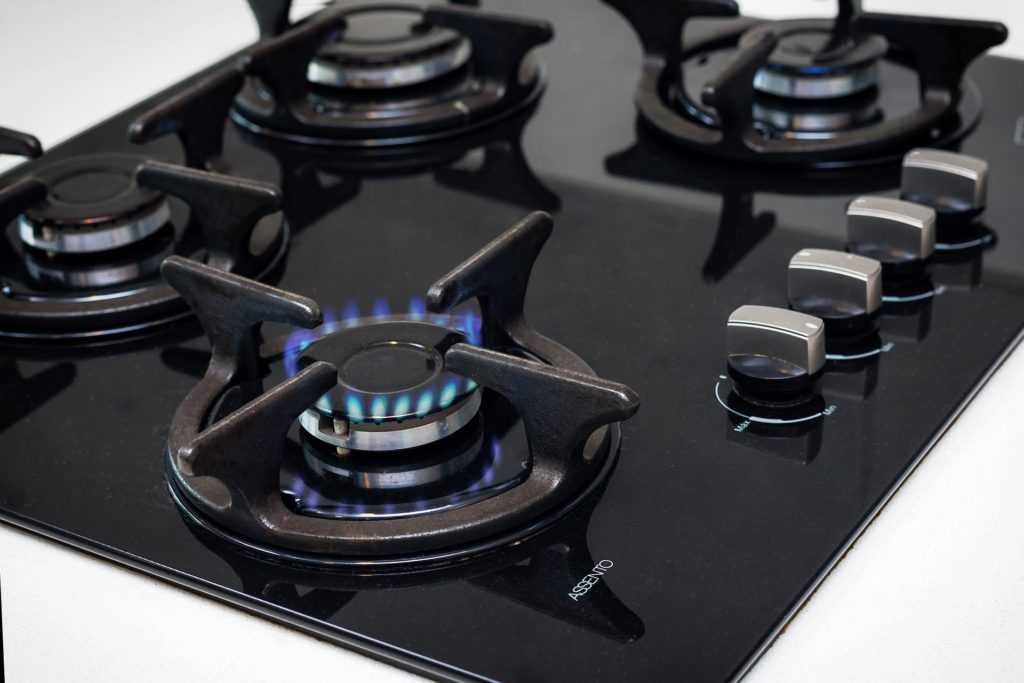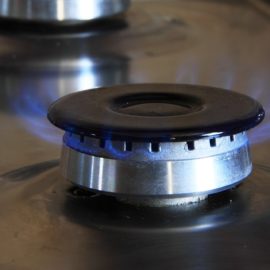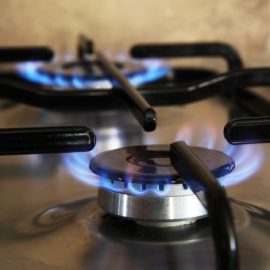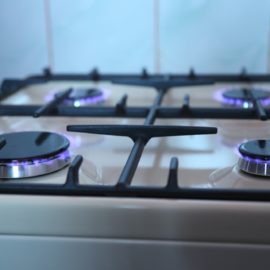
Gas stoves, which people like, are now part of the culture wars. A stove!
Republicans and allies of fossil fuels are rallying behind the humble gas stove, a staple in millions of U.S.kitchens that has emerged as a flash point in the nation’s ongoing culture wars and a source of conservative resistance to President Biden’s environmental agenda. The controversy was ignited when a member ofthe Consumer Product Safety Commission (CPSC), an agency charged with protecting the public from dangerous household products, said in mid-December that the commission will consider regulating indoor air pollution from gas stoves. On Monday, Commissioner Richard L. Trumka Jr., a Democrat, said in an interview that he had not ruled out a ban on the appliances, prompting the agency to pivot Wednesday and clarify it was not planning a ban. But the flame was already lit. Trumka’s comment prompted loud complaints from Republicans on Capitol Hill, who claimed that the commission was trying to snatch the stoves from the 40 million homes that rely on gas, even though any regulations would only affect new appliances and not existing ones. “I’ll NEVER give up my gas stove,” Rep. Ronny Jackson (R-Tex.) tweeted Tuesday. “If the maniacs in the White House come for my stove, they can pry it from my cold dead hands. COME AND TAKE IT!!”
washingtonpost.com
Jackson then urged his twitter vans to go to a republican funding site.
Jackson encouraged his nearly 550,000 Twitter followers to sign a petition on WinRed, a fundraising platform endorsed by the Republican National Committee, to “stop Biden from banning our stoves.” He also noted that first lady Jill Biden and Rep. Alexandria Ocasio-Cortez (D-N.Y.) have been photographed using the signature blue flames of gas cooktops. The backlash was bipartisan. Sen. Joe Manchin III of West Virginia, the Senate’s most conservative Democrat, tweeted Tuesday that “the federal government has no business telling American families how to cook their dinner.” The chair of the CPSC, Alexander Hoehn-Saric, walked back Trumka’s comments in a statement Wednesday morning, but reiterated that the agency will look at possible ways to curb gas stoves’ emissions. Research has linked their pollution to childhood asthma and other respiratory problems, along with global warming. “Research indicates that emissions from gas stoves can be hazardous, and the CPSC is looking for ways to reduce related indoor air quality hazards,” Hoehn-Saric said. “But to be clear, I am not looking to ban gas stoves and the CPSC has no proceeding to do so.”
This is just one foray into fighting climate change.
The gas stove furor reflects the challenges the Biden administration faces the next two years as it tries to enact tougher climate regulations. While Biden has pledged to halve the nation’s greenhouse gas emissions by the end of the decade, Republicans and the fossil fuel industry are fiercely resisting stricter environmental standards. By raising fears of a ban on gas stoves, Republicans are in some ways taking a page from former president Donald Trump, who often complained about energy-efficiency standards for household appliances — including lightbulbs that make you “look orange,” toilets that “don’t get any water,” showers that lack a “full shower flow” and “worthless” dishwashers.
Gas Stoves have come under attack but this is the first time the federal government has mentioned them.
The move by the CPSC marks the first time that the federal government has signaled it may crack down on pollution from gas stoves. But the battle has been brewing for years in states across the country, with Democratic politicians seeking to restrict gas use to curb climate change, while Republican leaders have sought to preserve a future for fossil fuels. New York Gov. Kathy Hochul (D) on Tuesday called for New York to become the first state in the country to ban natural gas heating and appliances in new buildings, noting that buildings are the biggest source of planet-warming emissions in the Empire State. Some cities — including Los Angeles, Seattle and New York — have also moved to limit gas use in certain new homes and apartments. Republican state officials and their allies in the natural gas industry have fought such efforts on multiple fronts. Twenty-one states, many with GOP-controlled legislatures, have passed laws to prevent cities from prohibiting gas use in buildings.The gas industry has also paid Instagram influencers to gush about the benefits of cooking with gas, an effort to hook younger consumers on the fuel. In Ohio, Gov. Mike DeWine (R) on Friday signed legislation to legally redefine natural gas as a source of “green energy.” Ohio state Sen. Mark Romanchuk (R) has acknowledged that he consulted an anonymously funded, pro-gas group about the measure. Romanchuk declined to comment through a spokesman.
Gas is a fossil fuel and if we are to control these fuels gas has to be a [part of the equation.
Scientists say the world needs to rapidly transition away from fossil fuels, including replacing gas appliances with cleaner versions that emit no pollution, such as electric and induction cook tops. The recently passed climate law, known as the Inflation Reduction Act, provides rebates of up to $840 for an electric stove or oven. Still, many chefs and home cooks stubbornly prefer cooking with gas. Mike Sommers, president and chief executive of the American Petroleum Institute, said he thinks it is unlikely that the CPSC will ban gas stoves, in part because of the congressional scrutiny that would follow. “The gas stove thing caught everybody by surprise,” Sommers told reporters Wednesday. “That’s not going to happen. I expect that Congress is going to engage heavily on that issue.” Rep. Cathy McMorris Rodgers (R-Wash.), the new chair of the House Energy and Commerce Committee, said in a statement that Republicans on the panel will “hold President Biden accountable for his war on American energy.” A spokeswoman for Manchin, who chairs the Senate Energy and Natural Resources Committee, said the panel has no plans to investigate the issue, which falls outside its jurisdiction.
Despite the furor, gas stoves are a health risk.
While the issue has become ensnared in partisan politics, scientists say a growing body of research shows that gas stoves pose a threat to the planet and public health. A peer-reviewed study published last month found that gas stoves are responsible for roughly 12.7 percent of childhood asthma cases nationwide — on par with the childhood asthma risks associated with exposure to secondhand smoke. A separate study published last year found that gas stoves — used nationwide but primarily in California, Illinois and northeastern states — release far more methane than previously thought, even when they are turned off. Methane, a potent planet-warming gas, traps about 80 times as much heat as carbon dioxide during its first 20 years in the atmosphere. “I don’t want to breathe the pollution that comes from gas combustion. In fact, I think people will look back and wonder why millions of us chose to,” said Rob Jackson, a climate scientist at Stanford University and a co-author of last year’s research on methane. “We don’t stand over the tailpipe of our car breathing in.”
The EPA can regulate interior spaces as refrigerators have been regulated.
The Environmental Protection Agency has the authority to regulate outdoor air pollution from cars, factories, power plants and other sources. But the agency lacks the legal power to limit indoor air pollution from gas stoves and other appliances inside people’s homes, prompting the CPSC to step in to fill this regulatory void. As early as 1986, EPA scientists wrote to the commission to express concerns about the potential health risks associated with pollution from gas stoves. But nearly four decades later, under intense pressure from policymakers and the fossil fuel industry, the commission is already backtracking from a possible ban. “These concerns go all the way back to the ’80s,” said Brady Seals, a manager at the environmental nonprofit RMI and a co-author of last month’s study. “Now, for the first time, policymakers are speaking about this and hopefully taking action.”
How many cook with gas? It depends on the state.
70 percent of California households had gas-fueled ranges, cook tops or ovens in 2020, while in Florida just 8 percent of households had them. In California, several cities have banned gas hookups in new construction. Late last year, the Los Angeles City Council unanimously approved a new ordinance, which will take effect later this year, that will make the city the largest in the state to prohibit natural gas in new buildings. The ordinance is similar to others passed in San Francisco, Berkeley, Cupertino and San Jose. These local bans have alarmed the gas industry and prompted it to counterattack. The American Public Gas Association, a trade group representing municipal gas providers, launched a national campaign to emphasize the virtues of gas, framing it as an affordable option that is less damaging for the climate than other fossil fuels. Some of the funding for this campaign came from customers of Los Angeles-based Southern California Gas. In 2018, California officials ordered the company, which serves millions of customers in the central and southern parts of the state, to stop using customer money on any activities related to new building standards. Last year, they accused the company of disregarding this prohibition and levied a nearly $10 million fine.
I am conflicted. I like my gas stove. I have cooked with electric stoves and this is better. Mine does not light with a flame but a spark so I don’t have a continuous flame. Is that better?



